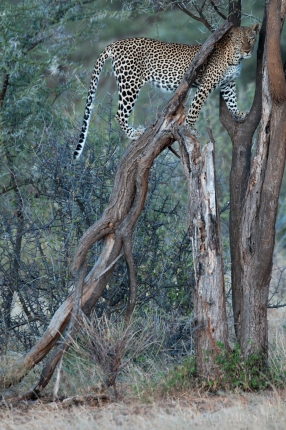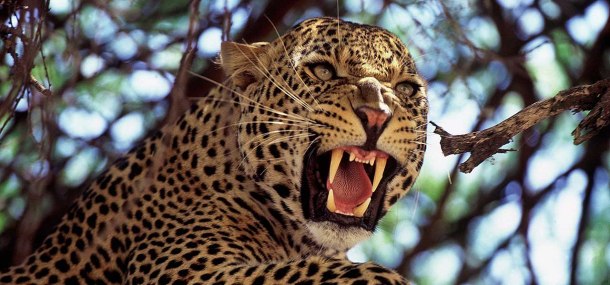As the sun goes down the African wilderness comes to life, nocturnal animals begin to stir – in a few hours they will be at their sharpest: alive, awake and for some, hunting. Among these nocturnal beasts lives the elusive and solitary leopard.
African Leopards, or panthera pardus, are one of the African ‘Big Five’ and are some of the most beautiful animals that roam the African plains. With their distinct spots, their coats are very unique and recognisable. These spots are called ‘rosettes’, as the shape is similar to a rose, and as prominent as these are their coat is still the perfect camouflage for the african bush as the rosettes blend into chaotic backgrounds of dry grassy areas and patchy trees. They are also primarily nocturnal, making them tricky to spot on daytime safaris, but they can be found on the prowl at dusk as they head out to hunt, or sometimes early in the morning with their night-time catch.

Despite being the 5th largest cat in the world, they are generally not big creatures. The size of males and females vary depending on their habitat, and females are normally 20-40% smaller than their male counterparts. This moderate size makes them very agile creatures – unsurprising really since they are, after all, from the cat family. With their cat-like features, they jump approximately three meters high and six meters wide, a skill that aids them hugely during their hunt. Using their camouflaged disguise to their advantage on the hunt, they are able to hunt very successfully through flatter but sometimes very dense bushlands as well as from treetops.
After a successful hunt, leopards frequently use their strength and agility to drag their prey into a tree to hide it from other predators – particularly from lions and hyenas who are often in the market for an easy meal. They are not only agile but also remarkably strong – larger males have been known to drag prey weighing up to three times their own body weight into a tree for safekeeping.


Socially, leopards are somewhat solitary animals. They do not interact with each other much at all and are very territorial, normally only coming into contact with each other for mating purposes. During the mating ritual, a male crosses into a female’s territory for just a few days before leaving again, after which he has no contact with the either the female mother or his cubs.

Following mating, leopards have a gestation period of 2-3 months and will normally have just 1 or 2 cubs. When giving birth, females do their best to hide themselves from other animals in order to protect their newborn cubs, which are an easy target for other predators. When their cubs are born, they have a notably different fur to their grown-up parents: their fur is longer, softer and does not yet have the well-defined black rosettes that characterise the fur of adults, but rather have a soft grey fluffy hair marked with smaller, weaker rosettes.
When cubs reach an age of approximately one year, it is time to learn to hunt. Teaching is normally done by the mothers, who in total rear their young through childhood and the teens for a total period of only around 18 months to 2 years, after which their cubs leave them, as they head off to find and fight for a territory they can call their own.

Follow us @robertmarksafaris for more stories and excellent African Wildlife photography.
